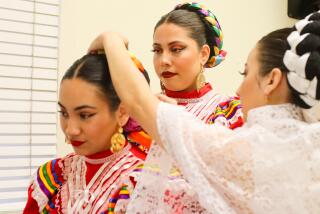IRVINE : Dancing to the Tunes of 2 Cultures
- Share via
As the sound of cymbals and the twang of string instruments began, Kwan Tantivejkul, 21, moved into the open veranda, her hands arched and her body swaying.
Wearing a traditional Thai dress woven with gold, and gold jewelry on her ears, neck, arms and ankles, she began a dance about a woman waiting for the man she loves.
Her solo performance Tuesday was part of a recruiting effort for the Laotian-Thai Cultural Club at UC Irvine. Laotian and Thai students jointly created the club last November “to inform people we exist here (at UCI) and to preserve our culture,” 21-year-old Theprangsy Nanthathammiko said.
There are many similarities between Laos and Thailand, she said. Both languages are written in similar characters, despite subtle differences, and sound like two dialects of the same tongue; traditional dances of the two lands are similar, with the Thai costumes generally more glamorous, and most Laotians and Thais are Buddhists.
“Both our countries are known for our many temples,” said Nanthathammiko, who was born in Laos but left at age 5 with her family.
Tantivejkul, whose family came to the United States from Thailand when she was 10, said she learned her native dances in America at a temple named the Wat Thai in Los Angeles. The temple also has weekend classes teaching the Thai language, music and literature.
She taught members of the Laotian-Thai Cultural Club the dances, which they performed in April for the group’s New Year Festival, she said.
The Laotian-Thai Cultural Club, Tantivejkul said, now has about 20 members. Its purpose “is to let people know who we are. Not ‘Oh, you’re Thai. You’re from Taiwan.’ Or, ‘Laos? What’s that?’ ”
Morgan Peterson, a freshman from Chicago Park of Northern California, said she was walking by the Cross Cultural Center on campus and was attracted by the dance performance. Afterward, she went inside to see the cultural displays, including handmade dolls and samples of Laotian and Thai writing.
“I think it’s really neat they kept their culture going and not let it disappear or become Americanized,” the 18-year-old Peterson said. “It’s also great they could share this with other people.”
More to Read
Sign up for Essential California
The most important California stories and recommendations in your inbox every morning.
You may occasionally receive promotional content from the Los Angeles Times.










